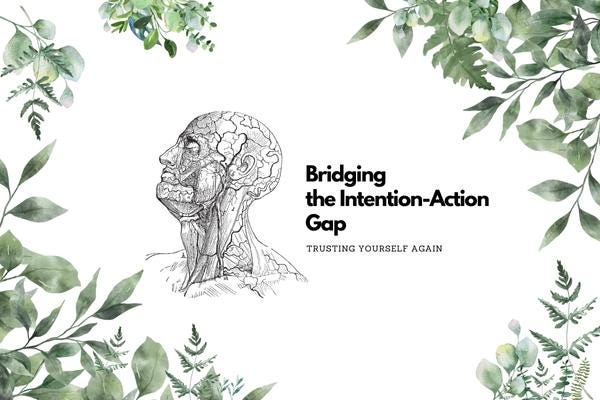Have You Stopped Trusting Yourself to Do What You Say You'll Do? Here's a Simple Way to Rebuild That Trust.
Self-efficacy is the secret sauce of an intentional life.
Most of us would like others to think we are reliable.
But do you trust yourself?
Do you take your own declarations seriously? Or are you only made of good intentions and wishful thinking?
Trust yourself again.
Here's the thing: if you don't keep the word you give to yourself, you stop trusting it. The bigger the gap between what you say you'll do and what you actually do, the more your self-trust erodes.
The Intention-Action Gap.
The first thing you need to address is to gain some of that trust back.
But how to bridge that intention-action gap?
You really want to do all this stuff, but it just doesn't happen.
First of all, don't trust your INTENTIONS.
They're like a mirage of a thirsty mind in a hot desert. You see what you want to see, but as you get closer, it all vanishes.
Understanding human nature is key here: we live in a world of powerful forces. There's distraction and attraction, and when you make plans, you're only using one part of your brain (prefrontal cortex), but it's not like the other part can be shoved under the carpet (limbic system).
Hope for the best, but prepare for the worst.
Promise yourself to do only what you know you can do and will do.
Instead of a ‚ to-do' list, create a ‚will do' list.
Promises are cheap; execution is not.
For years as I planned my day ahead, I would just jot down a bunch of tasks on my list and then do entirely different things.
It wasn't really a to-do list; it was a wishful thinking list.
I made plans for my future self, but my present self was never on board with it.
Then I had a hard look at my actions and felt ashamed.
Why do I even bother to put all this stuff there if I never get to it anyway?
It was a fantasy, not a reality.
Just the two of us.
So I started playing with a different concept:
Away with my good intentions list! And onto my commitment list, my non-negotiable list.
I could put ONLY the things I would do; if something makes it to that list, it's got to get done, no excuses.
It was a very short list.
A healthy number of tasks to start with?
ONE.
Imagine: of all the cool and not-so-cool stuff you have in your pile of tasks, and you get to pick just ONE.
Not five, not your top three, but ONE.
And when you choose it, you have to do it.
So you better figure out ahead of time when you'll do it and how you'll do it. Because it has to get done, come hell or high water.
It's just the two of you: you and your one task.
No windows to clean, no books to finish, no dings or dongs on your phone, nowhere to hide, and no escape.
The only way is through.
It strips things to the bare bones.
You got it done? Great!
You can pick another one.
Eliminating choice can be very freeing. It removes the friction of making a decision. It reserves all the energy for performing the task.
At the end of the day, ask yourself some questions:
Did you do it? Yes/No.
Yes? Great.
Was it easy to start but difficult to finish? If yes, then you may want to scale it down a bit.
Was it hard to start, but once you got going, you gained some momentum? If that's the case, you only need to focus on starting.
No? Follow up with: Why?
Then look at your answer and be honest with yourself: is this just an excuse? We will lie to ourselves to protect our Ego.
Don't worry; nobody's watching. You can tell yourself the truth.
Don't just lie to yourself that you'll do it tomorrow.
Dig deeper in a non-judgemental and compassionate way.
Were you too tired? Do it earlier in the day.
Were you confused about the how? Clarify it now.
Was it too overwhelming/difficult? Lower the bar until you get started.
Did you forget about it? It happens. Set multiple reminders in different formats.
Add accountability to the mix.
Outside accountability is a bit of a crutch - or a cast -but that is exactly what you need when your trust spine is fractured (or broken).
There's no shame in asking for help!
Use it to make the process easier for as long as needed until you collect enough evidence that you can trust yourself again.




